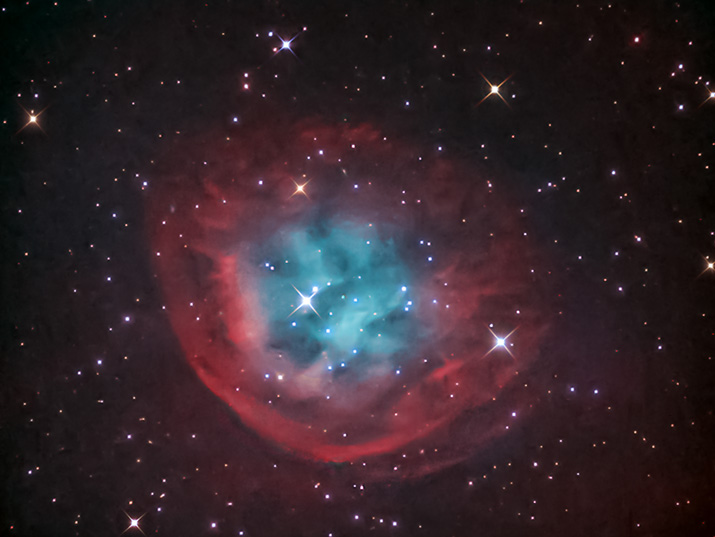
|
Date: Feb. 13-14, 2020 - Location: Davis Mountains west of Fort Davis, TX Telescope: 10 in. RC Mount: Paramount MX Camera: Apogee F8300M Exposure: Ha = 480 min OIII = 480 min. - 20 min. sub-exposures, bin 2X2 Click on the image below to view at higher resolution. |

|
Discovered in 1955 by George Abell Sh2-290, also designated as Abell 31, is a planetary nebula approximately 2,000 light years distant in the constellation of Cancer. As viewed from the Earth, this planetary nebula is one of the largest in our sky and is only exceeded by the Helix planetary nebula. The nebula is very faint and requires long exposures to bring out nebular detail and the extent of its extended halo. The progenitor star that formed the nebula is believed to have been about twice as massive as our Sun. As it aged, it evolved into a Red Giant and began expelling the outer shells of its atmosphere until only a compact core remained. This core, no longer capable of fusing elements, has evolved into a white dwarf star. It is extremely hot and produces prodigious amounts of ultra violet radiation. This excites the surrounding nebula and causes it to glow in the vivid colors you see in the image above. The red portions of the nebula are primarily composed of hydrogen and the blue is mainly from ionized oxygen. North is toward the top of the image. The nebula is moving toward the south and the sharp bow wave is being compressed by interaction with the interstellar medium. The fainter northern portion is on the down wind side and is a better representation of the primordial nebula as it was expelled during the Red Giant phase. The nebula is expanding, and dispersing, into interstellar space. Over a period of many thousands of years, the nebula will disappear and only the dying white dwarf will remain. The image above was assembled using hydrogen alpha (Ha) and doubly ionized oxygen (OIII) filtered images. The Ha image was mapped to the Red channel and the OIII was mapped to the Green and Blue channels. This method produces a near true color image that more closely portrays the natural color of the subject object.
Member of the Dark Sky Observatory Collaborative
1Astrodon Imaging
|